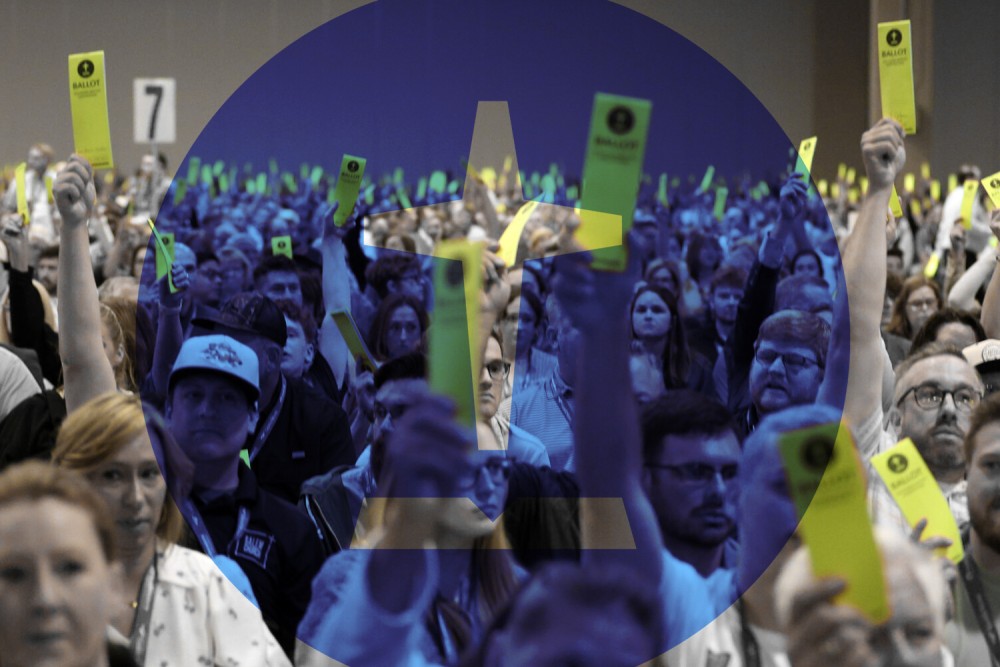Why does the Southern Baptist Convention wield so much political influence?
The SBC is loud, but it represents a slim minority of Christians who are out of step with the rest of the country.

The Southern Baptist Convention is trending again, thanks to generous news coverage of its annual conference. The New York Times, the BBC, and The Guardian have all run stories on the four-day conference, with nearly all mentioning the approved resolution calling for the overturning of laws and court rulings, including Obergefell v. Hodges, that “defy God’s design for marriage and family.”
Judging from the widespread coverage Southern Baptists receive, you might think they are a numerically significant voice in American religion. But in reality, there aren't many of them. According to the recent Pew Religious Landscape study, only 4 percent of adults in the US identify as Southern Baptists—and that number continues to skid downward. In 2024, the Southern Baptist Convention lost almost 260,000 members. Two decades ago, there were an estimated 16 million Southern Baptists. Today, there are roughly 12 million. Most of them (78%) live in the south, and nearly seven in 10 are over the age of 50.
These numbers are not impressive. Despite their leaders reporting an uptick in recent baptisms, the denomination is bleeding members. By any metric, the Southern Baptists are a religious minority (and like all religious minorities, they ought to be respected and protected, afforded the chance to worship freely, without state interference). At the same time, 4 percent is not a big number, and the Southern Baptist Convention by no means represents the majority view of US Christians.
And yet the shrinking denomination does indeed play an outsized role in shaping American public life. As Ruth Graham put it, the convention is “often seen as a bellwether for conservative evangelicalism writ large.” The larger evangelical group of which Southern Baptists are part comprises 23 percent of the country—certainly a significant population. Those denominations are even smaller than the Southern Baptists. The only group in the evangelical Protestant category that is larger is identified as “non-denominational", and they’re not known for their organizing power. So Graham is right to say that the SBC is representative of evangelical Protestants in the US, but that’s only because they’re better organized (and better funded) than other evangelicals.
The SBC has already altered the direction of our country by helping to elect Trump—twice. It’s no secret that the SBC feels empowered by Trump’s SCOTUS appointments, which resulted in a historic overthrow of Roe v. Wade, and that this likely contributes to their renewed boldness in calling for a ban on gay marriage. They know they’ve got a friend in the White House.
Still, despite the media coverage they earn, they are a fringe group, and they seem to know it and even embrace it. “We know that we’re in a minority culture right now,” Denny Burk told the New York Times, “but we want to be a prophetic minority.”
A prophetic minority who worships power? Who is politically aligned with greedy politicians who make life harder for the poor and marginalized? Who waters down the good news of Jesus Christ to a party platform? Who ignores allegations of abuse and trauma inflicted by the hands of their own celebrated leaders? These voices crying in the wilderness about gay marriage and sports betting and “biblical gender roles,” who are complicit in a nationalist movement that is known the world over for its rejection of empathy and compassion and basic kindness? These are prophets?
No, they are not. They are the voices of a slim minority who realize they are wildly out of step with the rest of the country, and who, because of a resurgence of conservative power, feel emboldened to be as loud as they can.
More than 70 percent of the country supports gay marriage. Not only do the majority of religiously-affiliated adults support same-sex marriage (57%), but marriages like mine and my husband Andy’s find support among large populations of Catholic (70%), Orthodox (58%), Historically Black (56%), and Mainline (71%) congregations. And even among evangelicals, support for same sex marriage has increased by almost ten points in the last decade.
The SBC can say what it wants, and journalists can and should report on what they believe to be newsworthy. But the rest of us should remember that Christianity is much, much larger than anything the SBC imagines it to be. And we should amplify the truly prophetic voices who remind us that God is a God of justice, ready to act on behalf of all of his people whose lives are made harder by emperors and their sycophants.





